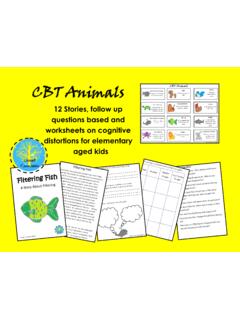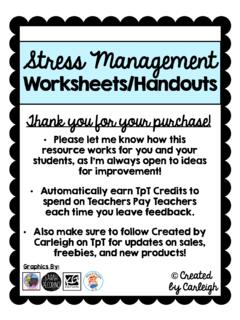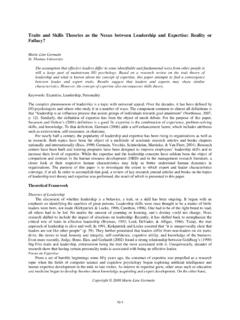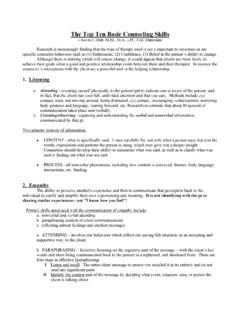Transcription of Handouts Emotional Regulation, Social Skills & Problem …
1 Handouts Emotional Regulation, Social Skills & Problem SolvingEmotional Regulation, Social Skills & Problem solving The Incredible Years Suggested Activities for the MonthTeacher Workshop Six TO DO Continue to refine behavior plans. Do Transition Plans for five of your students who are the most aggressive, inattentive, or impulsive. See transition plan forms and start filling these in. Practice Social Skills and Problem solving teaching with students in a small group circle time, or, use Wally Detective Book with students. Look for opportunities to label children s feelings ( , happy, excited, sad, calm, etc.) and connect them to their behavior. Call your buddy and share your approach to teaching children Problem READ Chapters Eleven, Twelve and Thirteen from Incredible Teachers the puppets introduce a Problem for the students to solve ( , being teased, being left out, feeling afraid, wanting to play with someone, etc.)
2 Emotional Regulation, Social Skills & Problem solving The Incredible Years Wally s Problem - solving StepsEmotional Regulation, Social Skills & Problem solving The Incredible Years 51 Tiny s Anger Management StepsEmotional Regulation, Social Skills & Problem solving The Incredible Years See Behavior Plan Workshop #3 for Steps #4 Prosocial Skills & Problem SolvingWorkshop #6 Behavior PlanStep #1:Step #3:Step #8:Step #9:Negative Classroom BehaviorsPoking, TouchingSpeaks without raising handTalks while directions are givenOff-task, daydreamingDesired Positive Opposite BehaviorsKeep hands to own body Raise a quiet hand Listen quietly when directions are givenPay attention & concentrateIndividual TeachingPractice quiet hand up and sitting with hands to selfUse cue cards to signal listening skillPraising child when focusing on task & listening & persistence coachingUse persistence coaching during small group work timesCircle Time TeachingWally talks about his difficulty remembering to put up quiet hand & listeningChildren talk about solutions and practice themExample of Behavior Plan: Jenny, Grade 1 Behavior Plan For: _____Step #1:Negative classroom behaviorsStep #3.
3 Desired BehaviorsStep #8 Individual TeachingStep #9:Circle Time Regulation, Social Skills & Problem solving The Incredible Years See Behavior Plan Workshop #3 for Steps #4 Prosocial Skills & Problem SolvingWorkshop #6 Behavior PlanStep #1:Step #3:Step #8:Step #9:Negative Classroom BehaviorsPushing, hitting peersEasily frustrated & angryDoesn t follow teacher directionsRejected by other childrenDesired Positive Opposite BehaviorsUse words to express feelingsUse a calm down strategyComplies with teacher directionsUses friendly behavior (help, share)Individual TeachingPraise for staying calm when frustratedRehearsal of calm down strategiesHand stamp for following directionsPraises children who play with himPromote his reputation as friendlyEmotion and Social coachingUse I can help and I m good at shar-ing stickers for this behavior when it occursCircle Time TeachingCalm down strategies (deep breaths, use Tiny Turtle shell, think happy thoughts)
4 Practice role plays for sharing, helping and teamwork skillsTeacher and practice Problem - solving steps (Wally)Teach and practice porblem- solving steps (Wally) using Problem - solving cue cardsExample of Behavior Plan: Mark, Grade 1 Behavior Plan For: _____Step #1:Negative classroom behaviorsStep #3:Desired Positive Opposite BehaviorsStep #8 Individual TeachingStep #9:Circle Time Regulation, Social Skills & Problem solving The Incredible Years Strengthening Prosocial Skills & Problem SolvingWorkshop #6 Behavior PlanBehavior Plan for:_____Step #1:Negative Classroom BehaviorsStep #3: Desired BehaviorsStep #8:Individual TeachingStep #9: Circle Time TeachingSee Behavior Plan Workshop #3 for Steps #4 Regulation, Social Skills & Problem solving The Incredible Years Brainstorm/Buzz Promoting a Sense of ResponsibilityBreak up into small groups or buzz pairs to share ways teachers promote responsibility in their : Emotional Regulation, Social Skills & Problem solving The Incredible Years Brainstorm/Buzz Changing Students Negative ReputationsBreak out into small groups or buzz pairs to share ways you, as a teacher, can change a student s negative reputation into a more positive reputationGoal.
5 Emotional Regulation, Social Skills & Problem solving The Incredible Years Brainstorm/Buzz Promoting Children s Self-Regulation Pair up with your buddy to share ways to promote children s learning of self-regulation : Emotional Regulation, Social Skills & Problem solving The Incredible Years Brainstorm/Buzz Emotional LiteracyWrite out all the Emotional words you want to encourage with your students. Try to have three positive or calming emotions words for every negative one. Combine a coping thought with a negative : Emotional Regulation, Social Skills & Problem solving The Incredible Years Brainstorm/Buzz Social CoachingWrite out the scripts you will use for Social coaching. Think about the Social behavior you want to describe and then how you will say : Emotional Regulation, Social Skills & Problem solving The Incredible Years Social /Friendship SkillsExamplesTeacher Models:v Sharing I m going to be your friend and share my car with you.
6 V Offering to Help If you want, I can help you with that by holding thebottom while you put another on top. v Waiting I can use my waiting muscles and wait until you re finished using that. v Suggesting Could we build something together? v Complimenting You are so smart in figuring out how to put that together. v Behavior-to-Feelings You shared with me. That is so friendly and makes me feel happy. You helped me figure out how to do that. I feel proud that you could show me that. Teacher Prompts:v Self-Talk Hmm, I really wish I could find another piece to fit here. Hmm, I m not sure I know how to put this together. v Asking for help Can you help me find another round piece? Can you share one of your cars with me? Teacher Response:v Praise child when s/he shares or helps you That was so helpful and friendly to share with me.
7 V Ignore or model acceptance when child does NOT share or helpContinue to use descriptive commenting. I can keep trying to find that round piece. (model persistence) I can wait until you re finished playing with the cars. (model waiting) I know it is hard to give up that car, so I will wait to have a turn later. Puppet or Action-Figure Models:v Entering Play Can I play with you? That looks like fun. Can I do that with you? v Being Socially Friendly I m being friendly. I d like to play with you. v Ignoring Aggression I want to play with a friendly person. I think I will find somebody else to play with. Teachers Promoting Emotional andSocial Competence in Young ChildrenTeacher-Child Social Coaching: Child Developmental Level 1 Teacher-Child Play: Teachers can use Social coaching in one-on-one interactions with their students to help them learn Social Skills and Emotional language before they begin to play with peers.
8 A great deal of the child s learning will occur by modeling and by your descriptive commenting, which will enhance your student s language Skills as well as help them recognize and learn Social Skills . Emotional Regulation, Social Skills & Problem solving The Incredible Years Social /Friendship SkillsExamplesTeacher Coaches:v Asking for What They Want You can ask your friend for what you want by saying, Please can I have the crayon? v Asking for Help You can ask your friend for help by saying Can you help me? v Asking a Friend to Wait You can tell your friend you are not ready to share yet. If your child responds to your prompt by using his or her words to repeat what you said, praise this polite asking or friendly Prompting:v Noticing Other Child Wow, look what a big tower your friend is building.
9 You are both using green markers. v Initiate Interaction With Other Child Your friend is looking for small green pieces. Can you find some for him? Your friend has not cars and you have 8 cars. He looks un-happy. Can you share one of your cars with your friend? v To Give Child a Compliment Wow! You can tell your friend his tower is cool. If you child does repeat this, you can praise him or her for a friendly compliment. If your child does not respond, continue descriptive Praising:v Behavior-to-Feelings You shared with your friend, that is so friendly and makes her feel happy. You helped your friend figure out how to do that, she looks very pleased with your help. v Playing Together Your friend is enjoying playing with these Legos with you. You look like you are having fun with your friend.
10 You are both very friendly. Puppet or Action-Figure Models:v Sharing or Helping Wow! Do you see the tower that Nancy is building? Can either of you help me find a red block to make this truck? Could I help you build that house? Do you think we could ask Freddy if he ll share his train? Teachers Promoting Emotional and Social Competence in Young ChildrenTeacher-Child Social Coaching: Child Developmental Level 2 Children in Parallel Play: Young children start out playing with other children by sitting next to them and engaging in parallel play. In the beginning, they do not initiate interactions with other children or seem to notice they are even there. They may not talk to them or offer an idea or interact with them in any way. Teachers can help promote peer play by prompting their students to use Social Skills or to notice their friends activities or moods.









